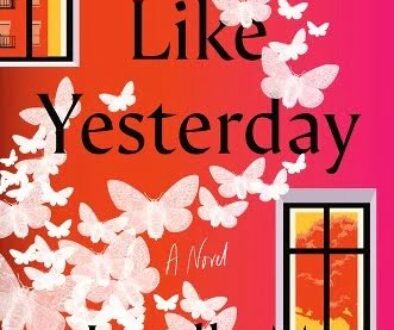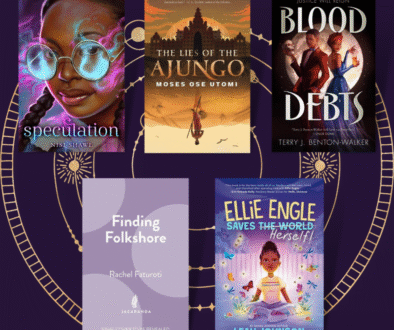The Plot Thickens: Bacchanal
Are you a fan of historical fiction about Black characters but wary of stories that center Black pain? Have you longed to see a Chosen One narrative that integrates West African lore rather than the religious tropes that tend to inspire these storylines? Did the cancellation of HBO’s vibrant, yet short-lived series Carnivale leave you wanting more? Veronica Henry has you covered in her debut novel, Bacchanal — a sprawling historical fantasy set in Dust Bowl-era United States.

The G. B. Bacchanal Carnival is not your average roadshow. From the mysterious red trailer, which only the secretive proprietor, Clay Kennel is known to enter, to the strange events that occur each time they stop in a new town, intrigue and mystique surrounds this company. Lured by the mystery and opportunity that this carnival presents during their stop in Baton Rouge, a place she’s called home for the past few years without ever truly belonging there, Eliza Meeks decides this is precisely the opportunity she needs. Having been abandoned by her family at a young age, she’s wandered aimlessly through life as a maid and reluctant animal whisperer. Sadly, her gift for communicating and assisting animals is met with whispers from the local townfolk not simply because they find her prowess odd, but because on occasion the very creatures she tries to aid end up dead.
Worn out from bearing this hostility, Eliza uses her ability to save the day when an alligator wrestling match goes wrong, catching the attention of Clay and his handsome second hand, Jamey. However, Eliza quickly learns that becoming part of the carnival is not all fun and games. First, she has to figure out where she fits in among a crew of seasoned carnival folk harboring their own secrets, goals, and general desires. Notably, Eliza has chosen to become part of this traveling carnival because of her own deep desire: she hopes to search for her missing little sister during each stop. Next, she has to design her own act using the two inhabitants that comprise the carnival’s tiny zoo without the guarantee that she can control her abilities well enough to prevent accidentally killing either creature. Most importantly, she has to resist her urge to investigate the red trailer that continues to loom in her awareness far longer than her introduction to the carnival by Clay. Plus? Her tentative feelings for Jamey.
Though Eliza is the protagonist of this story, we actually get peeks into the minds of so many different characters surrounding the carnival that often the story feels owned and led more by the inherent needs of the carnival itself rather than her concerns. For instance, the unseen demon who inhabits the red trailer needs the distraction and frivolity of the carnival to obscure her sometimes lethal, sometimes nurturing acts. In this novel, we get just as much time to contemplate the demon’s insight and actions as we do Eliza’s, Clay’s, and even some of the carnival attendees themselves. This omniscience lends to the generally frantic yet highly organized nature of the G. B. Bacchanal Carnival while also giving us a sense of why people barely on the upswing of financial recovery during the Great Depression are willing to spend their hard earned money on one night of entertainment. While this multiple perspective grounds us into the considerations of the time period, I can wonder if it takes up space that would answer some lingering questions I have about character motivations and relationships. Namely, it is clear that Eliza and the demon are destined to meet but we never fully understand why Eliza’s family is connected to the demon and how her powers provide her unique qualifications to meet this challenge. This book also includes a hinge romance where Eliza has two viable romantic choices yet we are never given a fully conceptualized reason why either option is better than the other. Don’t get me wrong, the story works okay despite this missing information, but I can’t help but consider how fully realized it may have been had these questions been answered.
Bacchanal is a charming story that marries the hardships faced in the historical reality of the Black diaspora experience — loss, misfortune, heartache, and trauma — with the surreal. With poignant lines like “The spirits desire to leave two things to our children: the first is roots, the other is wings,” this book yields insights and delights not unlike a good time at a carnival in real life.



